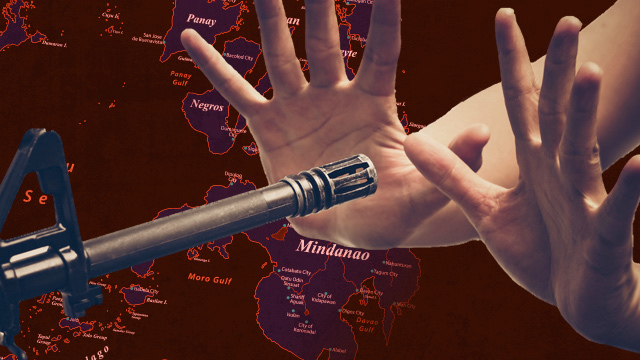According to the latest Conflict Alert, the biggest causes of violent conflict in 2016 are shadow economy issues, while political issues such as rebellion and extremism caused more fatalities.

The Autonomous Region in Muslim Mindanao (ARMM) saw an "explosion of violence" in 2016, according to the latest Conflict Alert launched by International Alert Philippines on Wednesday, November 29.
"There were 4,356 incidents in 2016, or an 89% increase from the previous year's 2,303 incidents. All provinces in ARMM saw increases in conflict incidents to more than double their previous year numbers in the case of Maguindanao (including Cotabato City), Basilan (including Isabela City), and Tawi-Tawi," the 63-page report said.
Lanao del Sur saw the smallest increase (22%) of incidents, followed by Sulu (68%). The increase in Maguindanao and Basilan was due to "an intensification of urban violence" in Cotabato City and Isabela City, respectively.
While Maguindanao posted the highest number of incidents, Basilan was ahead of Maguindanao in terms of conflicts per 100,000 persons or per 1,000 square kilometers.
The report noted that the increase in violent conflict incidents in ARMM happened amid the holding of local elections, the Duterte administration's anti-drug campaign, and the emergence of "a particularly lethal form of violent conflict: violent extremism."
The biggest causes of violent conflict, according to the report, are shadow economy issues. The same report defined shadow economies as pertaining to the informal or underground sectors of the economy that tend to fuel violent conflict.
In Mindanao, shadow economies include illegal drug and illicit firearm trades, kidnap-for-ransom, cattle rustling, smuggling, illegal gambling, carjacking, and human trafficking. The bulk of shadow economy-related conflicts took place in Maguindanao.
"The sharp rise in shadow economy-related incidents coincided with the start of President Rodrigo Duterte's term of office, specifically after a nationwide and coordinated anti-drug campaign was announced in July 2016," the report noted.
Illegal drug-related incidents also rose nearly 6-fold to 757 incidents in 2016. According to Conflict Alert Team Leader Judy Gulane, this does not imply that the shadow economy in illegal drugs was not as widespread in the ARMM provinces prior to 2016.
"What it does reveal is that a hornet's nest was stirred by the Duterte government when it launched the anti-drug campaign, turning a relatively 'quiet enterprise' into a site of violent conflict," Gulane said in a statement.
Political issues
The report also noted that political issues such as rebellion and extremism caused more fatalities in the region in 2016.
For instance, at least 198 deaths in 2016 were attributed to the Abu Sayyaf Group (ASG), making it the deadliest among the threat groups.
"However, in terms of conflict deaths per armed confrontation, the Maute Group trumped the ASG. Eight people were killed per attack launched by the Maute Group (8 to 1) in contrast to 3 people killed by per ASG attack (3 to 1)," the group's statement added.
Maguindanao accounted for the highest number of rebellion-related violence, amid the increasing attacks by the Bangsamoro Islamic Freedom Fighters (BIFF). Sulu and Basilan, both host to factions of the ASG, followed in terms of number of incidents. Lanao del Sur, meanwhile, saw the emergence of the Maute Group in 2016.
The report noted that the BIFF, the ASG, and the Maute Group have pledged allegiance to the Islamic State group (ISIS). The Maute Group is behind the Marawi City attacks that started on May 23, 2017, and lasted for almost 5 months.
According to International Alert Philippines, the steep rise in violence in 2016 shows the "urgent need for new and adaptable responses to conflict in Mindanao."
"Tackling violent extremism will require context-specific understanding. It is important for the government to monitor the actors, causes, and locations of violent conflict to see if an incident has the propensity to morph into more violence incidents, or conflict strings," said International Alert Philippines Deputy Country Manager Nikki de la Rosa.
She said the kind of conflict data provided in the Conflict Alert 2017 will "enable quick-response and effective conflict resolution efforts that not only focus on the security approach but also include processes that build community cohesion and resilience."
https://www.rappler.com/nation/189877-armm-violence-conflict-alert-2017

No comments:
Post a Comment
Note: Only a member of this blog may post a comment.